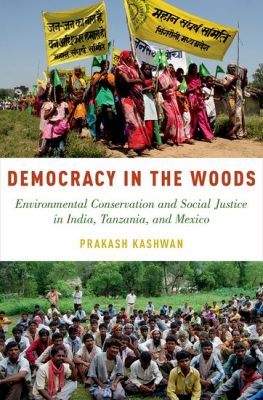DEMOCRACY IN THE WOODS: Environmental Conservation and Social Justice in India, Tanzania, and Mexico (Oxford University Press 2017)
How do societies negotiate the apparently competing agendas of environmental protection and social justice? Why do some countries perform much better than others?
 Democracy in the Woods addresses these question by examining land rights conflicts—and the fate of forest-dependent peasants—in the context of the different forest property regimes in India, Tanzania, and Mexico. These three countries are prominent in the scholarship and policy debates about national forest policies and land conflicts associated with international support for nature conservation. This unique comparative study of the trajectories of their national forestland regimes, challenges the received wisdom that redistributive policies necessarily undermine the goals of environmental protection. It shows instead that national environmental protection efforts take on either an inclusive (as in Mexico) or an exclusive form (as in Tanzania and, for the most part, in India), depending on whether dominant political parties are compelled to create structures of political intermediation, which help channel peasant demands for forest and land rights into the policy process.
Democracy in the Woods addresses these question by examining land rights conflicts—and the fate of forest-dependent peasants—in the context of the different forest property regimes in India, Tanzania, and Mexico. These three countries are prominent in the scholarship and policy debates about national forest policies and land conflicts associated with international support for nature conservation. This unique comparative study of the trajectories of their national forestland regimes, challenges the received wisdom that redistributive policies necessarily undermine the goals of environmental protection. It shows instead that national environmental protection efforts take on either an inclusive (as in Mexico) or an exclusive form (as in Tanzania and, for the most part, in India), depending on whether dominant political parties are compelled to create structures of political intermediation, which help channel peasant demands for forest and land rights into the policy process.
The political analysis of the control over and the use of nature presented in this book opens up new avenues for reflecting on how legacies of the past and international interventions interject into domestic political processes to produce specific configurations of outcomes of environmental protection and social justice.
This book offers three different tests of this theory of political origins of forestland regimes: First, India’s most radical forestland reforms became possible because of the opening of a unique political opportunity structure, which enabled forestland rights movements to successfully press for long-awaited institutional reforms needed to address land rights conflicts. Second, it successfully explains the rather counter-intuitive local outcomes of the programs for formalization of land rights in India, Tanzania, and Mexico. Third, it offers a coherent explanation of why each of these three countries proposes a significantly different distribution of the benefits of forest-based climate change mitigation programs being developed under the auspices of the United Nations. Democracy in the Woods offers a theoretically rigorous argument about why and in what specific ways politics determine the prospects of a socially just and environmentally secure world.
Advanced praise for Democracy in the Woods
“Kashwan’s brilliant book offers a multi-scale political analysis of the production of policy for the control and use of nature. He develops a neat way of analyzing how national forestry regimes come to be and how they act for and on different classes of people.” Jesse Ribot, Professor of Geography, University of Illinois.
“Combines multi-level analysis with nuanced cross-national comparison to reveal how historical legacies, the state, local politics and social actors interact to shape conflicts over social equity and environmental conservation.” Jonathan Fox, Professor, School of International Service, American University.
“In Democracy in the Woods, Prakash Kashwan takes an ambitious step in the comparative analysis of land rights and environmental politics in a study that spans three continents. Kashwan explains how, in contexts of great social inequality, political institutions and processes mediate links between forest conservation, local land rights, and social justice outcomes. He challenges both scholars and activists to broaden their understanding of sources of challenge and opportunity in conservation and land-rights politics.” Catherine Boone, Professor of Comparative Politics, London School of Economics.
“A hugely significant contribution to our understanding of the social justice dimensions of environmental policy. Kashwan brings in the third dimension of economic growth as well as giving this book a distinctive niche.” Jairam Ramesh, MP, former Minister of Environment and Forests, Rural Development, 2009-2014 Government of India.
Reviews
“The book powerfully reminds us that both conservation and social justice outcomes related to land have more to do with de facto implementation of governance regimes than with the de jure construction of those regimes and, in doing so, it reminds scholars of all forms of institutions and governance regimes that the failure of state agencies to enforce laws and policies may not be a lack of state capacity per se so much as the outcome of the state responding to the diverse pressures that are placed upon it by powerful actors with competing interests.” The European Journal of Development Research
“… a powerful portrayal of the complexities of governance and justice contained in the issues of land displacement and environmental conservation, which can both contribute to widening livelihood and habitat insecurity.” LSE Review of Books
“In this exceptionally detailed and ambitious study, Kashwan sets out to explain the divergence of forestland institutions in three cases-India, Mexico, and Tanzania-by crafting a rich historical account of the interactions between colonial legacies, populist politics, and contemporary global environmental politics.” Global Environmental Politics
“This is a dense and informative book that successfully integrates an historical analysis of rights with a discussion of current political conflicts.” The Journal of Peasant Studies
“As Kashwan’s excellently researched book shows, choosing between land rights of the peasants and forest dwellers and environmental sustainability is a false choice.” The Wire